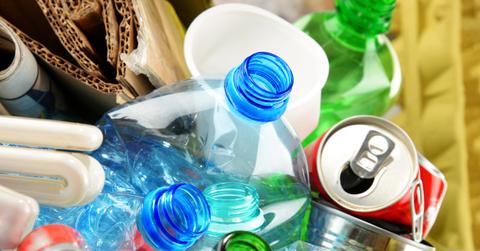This Robot Can Recognize and Grab Recyclables Before They're Sent To Landfills
At a municipal waste facility in Denver Colorado, an unlikely hero sorts through trash, and removes recyclable items before they are sent to landfills. His name is Clarke, and he's a robot, developed by AMP Robotics.
Updated Nov. 19 2020, 9:40 p.m. ET
There's no doubt that the world is currently suffering from a waste problem. A recent study revealed 91 percent of plastics are never recycled. Last year, The Los Angeles Times reported that by the year 2100, the world's nations are expected to generate around 4 billion tons of waste per year--up from the 1.3 billion annual tons they currently generate. But consumers aren't entirely to blame. Recycling isn't as straightforward as it may seem. It can be hard to know whether certain items belong in the trash or recycling bin, especially items composed of more than one material.
At the Alpine Waste and Recycling Facility in Denver, Colorado, one unlikely hero has the potential to vastly improve the way that people manage waste. His name is Clarke, and he's a robot. Created by AMP Robotics, Clarke's job is to sort through a conveyor belt of trash and rescue recyclables before they can be mistakenly sent to landfills.
Clarke is actually a robotic system installed in the ceiling above a conveyor belt at Alpine Waste and Recycling Facility. As AMP Robotics's website explains, Clarke's artificial intelligence, provided by his AMP Neuron software, has the ability to visually recognize certain items, such as juice cartons and plastic bottles.
Even though these items are mixed in with regular trash, Clarke is able to use its robotic arms to grab such items and separate them from the rest of the waste. Clarke wasn't meant to be one of a kind. Similar robotic systems can be installed in waste management plants in only a few days, and have the power to cut plants' sorting costs in half.
AMP also hopes that Clarke will soon be able to record data about the recyclables its sorting and make that information available to waste management staff. According to Brent Hildebrand, Vice President of Recycling at Alpine Waste and Recycling Facility, such data could prove just as useful as the robot's other functions.
“For me, having that data, especially at the end of the system, is huge, because it does tell me, maybe I have a piece of equipment that’s not functioning like it should, pulling out certain items," Hildebrand told Westword.
Clarke has the ability to pick out an average of 60 recyclables per minute from its conveyor belt--that's 60 pieces of trash every minute that don't immediately end up in a landfill. With skills like that, it isn't difficult to imagine that robots like Clarke may soon become an integral part of the solution to the world's waste problem.
